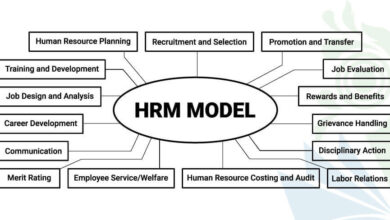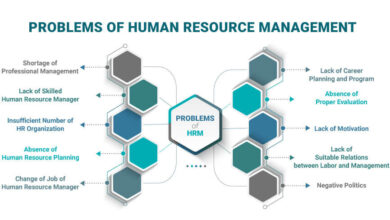Philosophy of Human Resource Management (HRM)
The collection of tasks that go toward finding, training, retaining, and using a group of individuals for the efficient operation of organizational tasks and the accomplishment of objectives is known as the philosophy of human resource management. It is the department inside an organization that is responsible for hiring management and giving the organization’s staff guidance.
Within a corporation, the human resources department is in charge of a variety of tasks. The most common responsibilities include recruiting new employees, onboarding new hires, managing employee benefits and records, administering payroll data, handling employee relations issues, and assisting with performance management processes. In order to be successful in these roles, human resource managers must have strong interpersonal skills as well as knowledge of labor laws and best practices.
Assumption
Technical expertise is important in HRM, but in the end, people’s actions are always based in part on the basic assumptions they make. This is especially true in regard to human resource management. The decisions and actions of human resource managers are based on their assumptions about what motivates employees and how they will respond to different policies and practices. If these assumptions are inaccurate, the resulting decisions and actions may not achieve the desired outcomes. Therefore, it is important for human resource managers to have a good understanding of employee motivation and behavior so that they can make more accurate assumptions and better decisions about how to manage them effectively.
The basic assumptions, decisions, philosophy, experiences, and organizations you make about people comprise your philosophy of Human Resource Management (HRM). Such as-
Decision
The philosophy of your company should be reflected in every personnel decision you make – from the people you hire to the training you provide and your leadership style. If you have a strong belief in your company’s mission and values, it will show in everything you do. Your employees will notice this, and it will create a positive work environment where everyone is working towards the same goal.
Philosophy
How you develop, your philosophy is based on many factors such as your experiences, education, values, assumptions, and background. You will have an initial philosophy when you start your job but it will evolve over time as you learn new things and gain more experience. It is important to be open-minded and always willing to learn so that your philosophy can grow and change with you.
Experience
Your philosophy is a set of beliefs that guide you through life. However, it is not static – as you learn and grow, your philosophy should evolve to reflect your new understanding of the world. Do not be afraid to question your own beliefs and reconsider them in light of new information. By constantly learning and growing, you can ensure that your philosophy evolves along with you. It is very important to cooperate with the principles of HRM.
Organization
The philosophy of an organization’s top management is communicated through their actions. This shapes the culture and values of the organization. The managers’ actions show what they believe is important, which filters down to the rest of the employees. If the managers prioritize profit over people, this will be reflected in their decisions and how they treat employees. On the other hand, if they prioritize employee development and satisfaction, this will also be evident in their actions. Ultimately, the philosophy of an organization’s top management sets the tone for everything else that happens within the company.

Philosophy of Human Resource Management (HRM)
The basic functions of Human Resource Management action in any company derive from its philosophy toward people. Every business has a philosophy, even if it is not documented. It guides personnel policies. These are the contrasting views regarding employees at work:
1. Technical Factor
Labor is viewed as a technical factor of production. They are exchangeable and treated like a commodity. They are viewed as mere cogs in the machinery and are subject to arbitrary hiring and firing. These ideas are supported by Taylor and Adam Smith’s writings. Employees must be controlled and closely supervised by Management with limited potentiality. This is in line with the notion put out by Douglas McGregor.
2. Human Factor
Labor has been viewed as a human factor with many positive potentials. Consequently, they must be treated with decency and respect. People are assets, not costs. Investment in people is very rewarding and dignified, Management must county who realized the importance of human veiling in its attempt to human values, it achieved unprecedented progress in all fields. Different countries can follow the instance of giving in fortune on HRM to increase productivity. She can talk about many projects to develop human resources by training and utilizing vast human resources.
3. Leadership Factor
Leadership style factors in human resource management are important to consider from a philosophical perspective. Different leadership styles can affect the way that employees are managed, and this can have implications for the overall effectiveness of the organization. It is important to select a leadership style that is compatible with the company’s philosophy and culture in order to create a cohesive environment and ensure that all employees are able to contribute effectively.
4. Corporate Cultural Factor
Corporate culture factors heavily into the philosophical perspective of human resource management. A company’s culture can dictate how employees are treated, what benefits they receive, and how much leeway they have in terms of job duties and responsibilities. As such, it is important for companies to carefully consider their corporate culture when developing their HRM philosophies.
5. Corporate Values Factor
Corporate values are the guiding principles that dictate how a company operates. They provide a framework for decision-making and help to create a cohesive culture. When it comes to human resource management, corporate values play an important role in shaping the philosophy of the organization. By clearly articulating what is important to the company, HR can align its policies and practices with these core values. This helps to create a more positive work environment and attracts employees who share similar beliefs. Ultimately, operating in line with corporate values leads to better business outcomes.
6. Market Competition
From the philosophical perspective of human resource management, market competition factors are considered to be important in setting wages and salaries. This is because they provide a mechanism for employers to compete for workers by offering higher pay and better working conditions. In addition, market competition factors can also help to improve worker productivity by providing incentives for workers to improve their skills and work harder.
Final Verdict
The philosophy of human resource management (HRM) is the belief that people are the most important asset in an organization. This philosophy is based on the idea that if people are treated well, they will be more likely to contribute to the success of the organization. The goal of HRM is to create a work environment where people can thrive and be productive.




